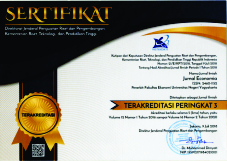Credit Expansion and Its Impact on Income Inequality of the Provinces in Indonesia
DOI:
https://doi.org/10.21831/economia.v15i1.23710Keywords:
Gini Index, Government Expenditure, Highest to Lowest Income Ratio, MSMEs credit expansion, Panel dataAbstract
AbstractThis research aims to study the determinants of income inequality at the provincial level in Indonesia, through observing MSMEs credit, government expenditure of education and health, school participation rate, and unemployment rate. We employed Fixed effect panel data, implementing Panel Corrected Standard Error (PCSE) and found that MSMEs credit, government expenditure on education, and school participation rate are significant in reducing income inequality. On the other hand, unemployment has been proven to have a positive impact on income inequality. However, implementation of National Health Insurance, relative to our period of observation, makes the result of government expenditure on health requires further analysis. Empirical result found that the increase in credit distribution to the MSME sector can reduce the level of income inequality and highest to lowest income ratio, on average in each province in Indonesia. The government is expected to focus on education and health budget to improve the community's quality of life.
Keywords: Gini Index, Government Expenditure, Highest to Lowest Income Ratio, MSMEs credit expansion, Panel data
Ekspansi Kredit dan Dampaknya terhadap Ketimpangan Pendapatan pada Provinsi di IndonesiaAbstrak
Penelitian ini bertujuan untuk mempelajari faktor-faktor yang memengaruhi ketimpangan pendapatan di tingkat provinsi di Indonesia, dengan mengamati kredit UMKM, pengeluaran pemerintah untuk pendidikan dan kesehatan, tingkat partisipasi sekolah, dan tingkat pengangguran. Dengan memanfaatkan pendekatan Fixed Effect dengan Panel Corrected Standard Error (PCSE), ditemukan bahwa kredit UMKM, pengeluaran pemerintah untuk pendidikan, dan tingkat partisipasi sekolah secara signifikan mampu mengurangi ketimpangan pendapatan. Di sisi lain, pengangguran terbukti memiliki dampak positif pada ketimpangan pendapatan. Namun, penerapan Jaminan Kesehatan Nasional, relatif terhadap periode pengamatan kami, membuat hasil pengeluaran pemerintah untuk kesehatan memerlukan analisis lebih lanjut. Di lain pihak, ditemukan bahwa peningkatan distribusi kredit ke sektor UMKM dapat mengurangi tingkat ketimpangan pendapatan dan rasio pendapatan tertinggi hingga terendah, rata-rata di setiap provinsi di Indonesia. Pemerintah diharapkan fokus pada anggaran pendidikan dan kesehatan untuk meningkatkan kualitas hidup masyarakat.
Kata Kunci: indeks Gini, pengeluaran pemerintah, highest to lowest income ratio, UMKM, ekspansi kredit
References
Akinbobola, T.O. & Saibu, M.O.O. (2004). Income inequality, unemployment, and poverty in Nigeria: a vector autoregressive approach. The Journal of Policy Reform, 7(3), 175– 183.
Anderson, E., D'Orey, M.A.J., Duvendack, M., & Esposito, L. (2016). Does Government Spending Affect Income Inequality? a Meta-Regression Analysis. Journal of Economic Surveys, 0(0), 1–27.
Beck, T., Demirgí¼í§-Kunt, A. & Levine, R. (2007). Finance, inequality and the poor. Journal of Economic Growth, 12(1), 27–49.
Clarke, G., Heng-fu, Z. & Xu, L.C. (2003). Finance and Income Inequality: Test of Alternative Theories. Policy Research Working Paper Series 2984, The World Bank.
Clarke, G.R.G., Xu, L.C. & Zou, H. (2006). Finance and Income Inequality: What Do the Data Tell Us? Southern Economic Journal, 72(3), 578–596.
Duman, A. (2008). Education and Income Inequality in Turkey: Does Schooling Matter? Financial Theory and Practice, Institute of Public Finance, 369–385.
Gimet, C. & Lagoarde-Segot, T. (2011). A closer look at financial development and income distribution. Journal of Banking and Finance, 35(7), 1698–1713.
Greenwood, J. & Jovanovic, B. (1990). Financial Development, Growth, and the Distribution of Income. The Journal of Political Economy, 98(5), 1076–1107.
Indriyatni, L. (2013). Analisis Faktor Faktor yang Berpengaruh Terhadap Keberhasilan Usaha Mikro dan Kecil (Studi pada Usaha Kecil di Semarang Barat). Jurnal STIE Semarang, 5(1), 54–70.
Jauch, S. & Watzka, S. (2016). Financial development and income inequality: a panel data approach. Empirical Economics, 51(1), 291–314.
Kappel, V. (2010). The effects of financial development on income inequality and poverty. Proceedings of the German Development Economics Conference 2010, Hannover.
Li, H., Squire, L. & Zou, H. (1998). Explaining International and Intertemporal Variations in Income Inequality. The Economic Journal, 108(446), 26–43.
Liang, Z. (2006). Financial Development and Income Distribution: A System GMM Panel Analysis With Application To Urban China. Journal of Economic Development, 31(2), 1–21.
Liu, G., Liu, Y. & Zhang, C. (2016). Financial Development, Financial Structure and Income Inequality in China. World Econ, 40: 1890-1917.
Mello, L. de & Tiongson, E.R. (2006). Income Inequality and Redistributive Government. Public Finance Review, 34(3), 282-305.
Meyer, L. (1998). The present and future roles of banks in small business finance. Journal of Banking & Finance, 22(6–8), 1109–1116.
Mocan, H.N. (1999). Stuctural Unemployment, Cyclical Unemployment and Income Inequality. The Review of Economics and Statistic, 5(2), 122–134.
Monnin, P. (2014). Inflation and Income Inequality in Developed Economies. Working Papers 1401, Council on Economic Policies.
Narob, N. (2015). Income Inequality and Inflation in Developing Countries: An Empirical Investigation. Economics Bulletin, 35(4), 2888–2902.
Otoritas Jasa Keuangan. (2016). Master Plan Sektor Jasa Keuangan Indonesia 2015-2019. Jakarta: Otoritas Jasa Keuangan.
Park, K.H. (1996). Educational expansion and educational inequality on income distribution. Economics of Education Review, 15(1), 51–58.
Qazi, W., Syed Ali Raza., Syed Tehseen Jawaid & Mohd. Zaini Abd Karim. (2016). Does expanding higher education reduce income inequality in emerging economy? Evidence from Pakistan. Studies in Higher Education, 5079(5), 1–21.
Rahmayanti, Y. (2012). Government Expenditure Efficiency, Economic Growth and Income Inequality: Evidences from Developing Countries and Indonesia. Osaka: Osaka University.
Ram, R. (1989). Can educational expansion reduce income inequality in less-developed countries? Economics of Education Review, 8(2), 185–195.
Sehrawat, M. & Giri, A.K. (2016). Panel data analysis of financial development, economic growth and rural-urban income inequality. International Journal of Social Economics, 43(10), 998–1015.
World Bank. 2012. The Little Data Book on Financial Inclusion 2012. Washingon DC: The World Bank.















